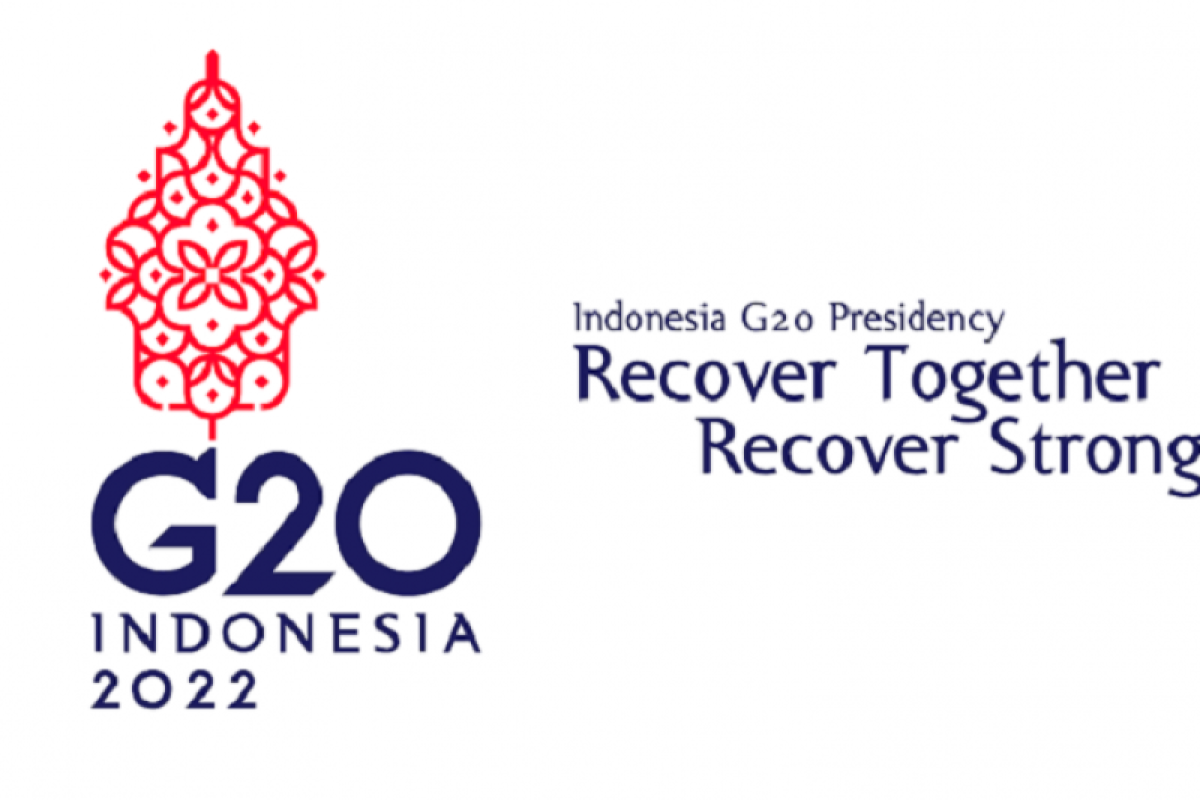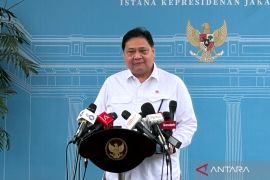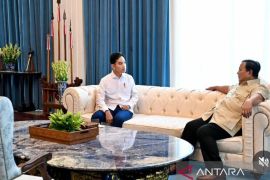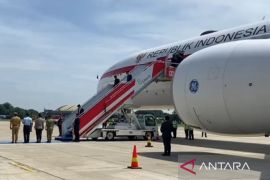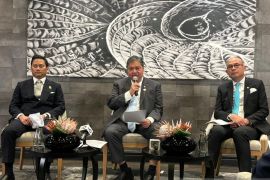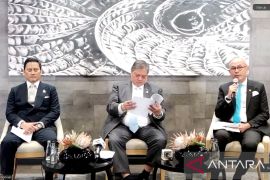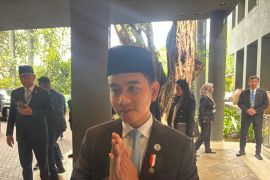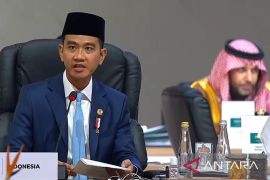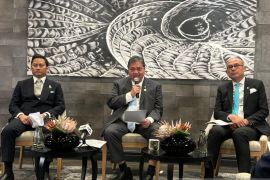We see that the G20 presidency will help boost Indonesia’s digital transformation agenda by advocating the agenda and Indonesia’s interests and realizing a fair level playing field between developed and developing countriesJakarta (ANTARA) - Indonesia will, for the foremost time, since December 1, 2021, lead the international forum of countries, or G20, that contribute 80 percent of the global gross domestic product (GDP).
Italian Prime Minister Mario Draghi handed over the G20 presidency to President of the Republic of Indonesia Joko Widodo (Jokowi) at the G20 Summit in Rome on October 31, 2021.
As Indonesia has assumed the presidency, it currently holds global trust to fulfill some agendas successfully, in particular, pertaining to global recovery through concrete efforts and solutions.
President Jokowi has emphasized that Indonesia’s G20 presidency should not merely be a ceremony but rather produce real actions.
To this end, Indonesia will continue to encourage member states to create major breakthroughs in addition to building collaboration and power aimed at ensuring that the international community benefited from such cooperation.
“The trust means the opportunity for Indonesia to contribute bigger for global economic recovery as well as to build more healthy, just, and sustainable global governance based on independence, eternal peace, and social justice,” the president highlighted.
With “Recover Together, Recover Stronger” as the theme, Indonesia is eyeing to boost inclusiveness in its G20 presidency, so that not only member states but also other developing nations can be benefited by such a high-level conference.
Related news: Bali beautification project underway to welcome G20 agendas
The involvement of Pacific and Caribbean Island countries apart from other developing countries in Africa, the ASEAN, and Latin America, for the first time in the history of the G20 presidency has reflected Indonesia’s proclivity toward inclusiveness.
The Caribbean Community (CARICOM), currently chaired by Antigua and Barbuda, will represent the Caribbean countries. Meanwhile, the Pacific Islands Forum (FAF), currently chaired by Fiji, will represent the Pacific countries.
On a national scale, the government is keen on involving several communities, especially those at the grassroots level, to be benefited from the G20 presidency.
Hence, the government has identified specific sectors that are strongly related to most citizens— including the digital economy, women's empowerment, and Micro, Small, and Medium Enterprises (MSMEs)— that will likely be brought up during the G20 presidency.
A preliminary study of the Coordinating Ministry for Economic Affairs and Universitas Indonesia found that Indonesia’s G20 presidency will have short-term impacts on job creation for 33 thousand people across meeting venues, increasing the national GDP to Rp7.43 trillion, and offering economic benefits 1.5 folds higher than those of the 2018 Annual Meeting of IMF and World Bank in Bali.
For medium- and long-term impacts, the presidency will help boost the nation's tourism and expedite economic recovery; showcase Indonesia’s development progress in infrastructure, connectivity, and foreign investment; attract more foreign investment for green economic development; and demonstrate Indonesia’s vaccination progress that will lead to improving global trust in pandemic handling.
Related news: Ministry to raise global healthcare reform plan in G20 agenda
Three Key Focus Areas
Foreign Affairs Minister Retno Marsudi drew attention to three key focus areas to frame Indonesia’s G20 presidency for the year ahead that entailed building a stronger global health architecture, fostering energy transition, and conducting digital transformation.
Health is the main issue in battling the pandemic that has protracted until now. The G20 state leaders have agreed to expedite vaccination to 40 percent by the end of 2021 and to 70 percent by mid-2022.
Healthy citizens are the basic foundation in pursuit of global recovery due to the pandemic, and vaccination is viewed as an effective weapon to fight the virus in order to surmount the health and economic crises.
“The pandemic has given us a valuable lesson that health insurance is very important,” Marsudi noted.
As a current G20 leader, Indonesia strives to provide equitable access to vaccines, especially for developing countries.
To this end, President Jokowi has put forth some measures that encompass designing the funding mechanism of global health resources; drafting global health protocols for cross-border activities; and optimizing the role of G20 to address the gap and scarcity of vaccine, medicines, and essential health equipment.
The second focus is energy transition that should be urgently resolved since G20 countries not only contribute to 80 percent of the global GDP, but they also contribute to 80 percent of the global greenhouse emissions.
Marsudi admitted to a profound debate while discussing the target of carbon emission reduction, with its time frame, to achieve the net zero emission target set during the G20 Summit in Rome, Italy.
Related news: Indonesia's bubble protocols in G20 draw acclaim from countries
During the COP26 Summit in Glasgow, the United Kingdom, Indonesia had committed to achieving net zero emissions by 2060 or even earlier.
To realize such an ambitious target, the government has drafted a road map in line with the Long-Term Strategy for Low Carbon and Climate Resilience (LTS-LCCR).
The third focus is digital transformation that has become a necessity and has been included in the road map of Making Indonesia 4.0.
Indonesia first becomes the chair of the Digital Economy Working Group (DEWG), as its status of being a task force during Italy’s G20 presidency has been elevated.
The G20 presidency will help boost Indonesia’s digital transformation agenda since the issue is closely related to several sectors, Communication and Informatics Minister Johnny G. Plate remarked.
“We see that the G20 presidency will help boost Indonesia’s digital transformation agenda by advocating the agenda and Indonesia’s interests and realizing a fair level playing field between developed and developing countries,” he remarked.
The presidency will also proffer benefits to players of the digital technology industry in Indonesia, as a melting pot for them and for cross-sector regulators, to optimize digital technology as well as to showcase potentials, innovations, and creativity of Indonesians in utilizing digital technology, he added.
Moreover, the Digital Economy Task Force (DETF) status that levelled up to DEWG has offered an opportunity for Indonesia to lead the discussion on global digital economy policies.
On the other hand, Indonesia should have competent communication skills at the national and global scales to help achieve the G20 goals optimally, according to the international relations expert at Padjadjaran University Teuku Rezasyah.
To this end, each ministry and institution as well as the related stakeholders should work in synergy and apply bureaucratic transparency, he added.
Related news: Government ensures G20 delegations use special flight route
In addition, Indonesia should be able to ensure that G20 member states share with the world their best practices to explore each country's potentials.
“G20 is not only a project but it also a bet to determine Indonesia’s future. If it does not communicate well, then we will be considered as incompetent. Do not let the lack of communication make our scores drop,” Rezasyah noted.
Nationally, the G20 should have a greater impact at the grassroots level, including children, that can be bridged by the highlighted issues, such as environmental preservation through mangrove plantation and MSMEs.
“Such efforts can be made by designating at least one district in each province that can be a benchmark. Do not let G20 only have impacts among the elite groups,” he remarked.
Related news: G20 success will open investment opportunities for Indonesia: official
Related news: Indonesia to implement bubble system for G20 events: official
Editor: Fardah Assegaf
Copyright © ANTARA 2021
